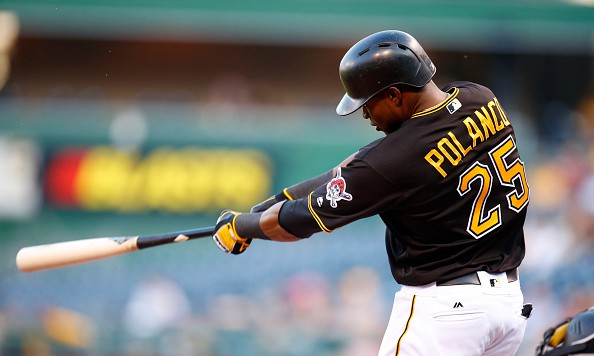One of the big mistakes that we, as baseball fans, make (and I’m including myself in this group with a bullet) is assuming that all players develop along a similar pattern. Andrew McCutchen and Starling Marte and Gregory Polanco all came up through the minors as five-tool centerfielders with gap power and very high ceilings, and so the expectation for Polanco (pretty inarguably the best prospect of the three if you compare them each at the moment they were called up) was that he’d adjust every bit as quickly as McCutchen and Marte did. That’s a steep curve. McCutchen was called up in June of 2009 and had a 121 OPS+ in 108 games that year. Marte was a bit uneven in his 47 games in 2012, but he was an above-average hitter that year and he was a big asset in his first full year in 2013 (121 OPS+ and great defense that’s made him a ~5-win player ever since).
Polanco obliterated Triple-A pitching in 2014 and started strong in black and gold. He had five hits in his fourth game, including a game-winning home run in extra innings, and when his 11-game hitting streak to start his career ended, he had 19 hits and a .365/.421/.442 line. His first slump was not far behind; from June 27th until the end of 2014, Polanco hit .201/.272/.311 last year. Neither McCutchen nor Marte had ever struggled like that, and so when Polanco had an up-and-down year last year, I don’t think that I was alone in wondering if his ceiling wasn’t quite as high as I’d hoped.
This year, of course, is much different. After last night’s performance, Polanco’s hitting .307/.395/.546. He leads the National League with 17 doubles, and he’s on pace for ~20 homers and close to 100 walks. Through more than a quarter of the season, he’s obviously the best hitter on an offense that leads the NL in on base percentage, is second in OPS, and is third in runs scored. There are more games to play and constant adjustments to make, but any question about Polanco’s ceiling feels ridiculous right now; he’s hitting like MVP-level Andrew McCutchen and he hasn’t turned 25 yet.
It’s not all that hard to figure out what’s different about Polanco this year. A lot was made of his impressive plate patience early in the season, but plate patience was always a huge part of what made him a phenomenal prospect. Last year, his strikeout and walk rates tacked pretty closely to Neil Walker’s, and so while his walk rate is up this year, his newfound patience is not earth-shattering. What’s interesting to me is that if you look at his plate-discipline patterns, the big difference is not that he’s swinging less at ptiches out of the strike zone (he is, but not by a big margin), he’s actually swinging more at pitches in the strike zone. He’s seeing fewer fastballs and more sliders and fewer strikes overall this year (which means that pitchers are trying to adjust to him, without much success), which is why he’s walking more. He really hasn’t been more patient at the plate, he’s been more judicious.
His swing changes have already been talked about in a few places, by Travis Sawchik with some further sabermetric analysis and illustrations of the changes by Jeff Sullivan. Sullivan explains his increased swing percentages at pitches in the zone with his shorter swing. He can drive inside pitches better with a shorter swing, so he swings at them more often. The swing changes bear themselves out in obvious ways in his batted ball data, too. Polanco has a line drive rate of 26.7% this year, after sitting at 19.1% and 19.7% in his first two years. His ground balls are way down (38.2%, after being in the 45-50% range), too, which is encouraging. His pull numbers are up quite a bit (45.5% after being around 39% his first two years), which is reflective of that shorter swing and more comfort with inside pitches.
I think that Sullivan summarized all of this nicely, by saying that “this feels like Gregory Polanco closing a hole.” These are all of the things that felt like they were missing from Polanco’s first two years: a quicker swing, more ability to pull the ball, fewer grounders, more line drives. When I watch Polanco at the plate in 2016, I don’t think, “I wonder if he can keep this up.” I think, “He’s here.”
Photo by Justin K. Aller/Getty Images




















